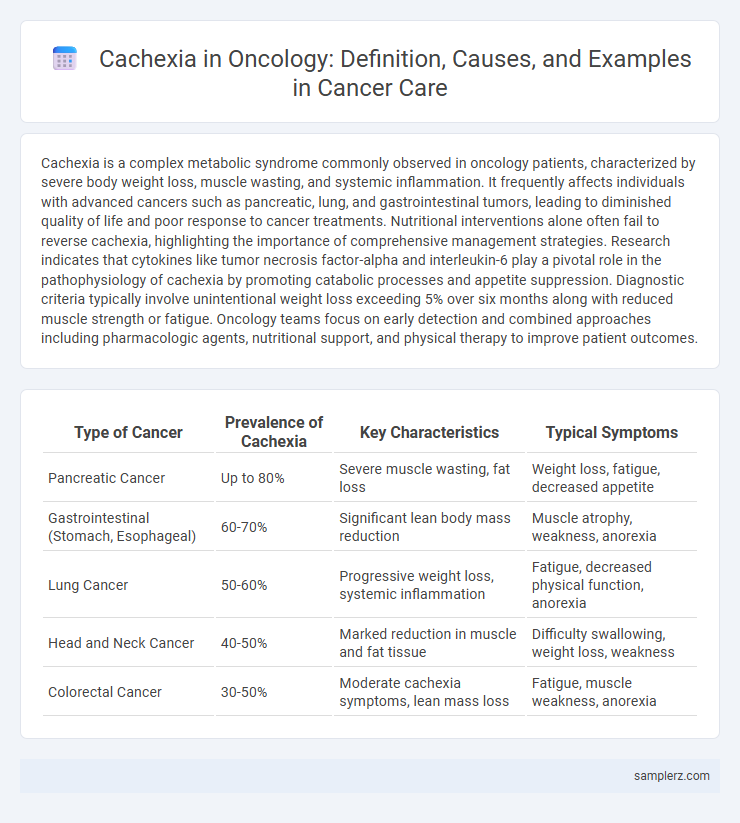Cachexia is a complex metabolic syndrome commonly observed in oncology patients, characterized by severe body weight loss, muscle wasting, and systemic inflammation. It frequently affects individuals with advanced cancers such as pancreatic, lung, and gastrointestinal tumors, leading to diminished quality of life and poor response to cancer treatments. Nutritional interventions alone often fail to reverse cachexia, highlighting the importance of comprehensive management strategies. Research indicates that cytokines like tumor necrosis factor-alpha and interleukin-6 play a pivotal role in the pathophysiology of cachexia by promoting catabolic processes and appetite suppression. Diagnostic criteria typically involve unintentional weight loss exceeding 5% over six months along with reduced muscle strength or fatigue. Oncology teams focus on early detection and combined approaches including pharmacologic agents, nutritional support, and physical therapy to improve patient outcomes.
Table of Comparison
| Type of Cancer | Prevalence of Cachexia | Key Characteristics | Typical Symptoms |
|---|---|---|---|
| Pancreatic Cancer | Up to 80% | Severe muscle wasting, fat loss | Weight loss, fatigue, decreased appetite |
| Gastrointestinal (Stomach, Esophageal) | 60-70% | Significant lean body mass reduction | Muscle atrophy, weakness, anorexia |
| Lung Cancer | 50-60% | Progressive weight loss, systemic inflammation | Fatigue, decreased physical function, anorexia |
| Head and Neck Cancer | 40-50% | Marked reduction in muscle and fat tissue | Difficulty swallowing, weight loss, weakness |
| Colorectal Cancer | 30-50% | Moderate cachexia symptoms, lean mass loss | Fatigue, muscle weakness, anorexia |
Understanding Cachexia in Oncology Patients
Cachexia in oncology patients manifests as severe muscle wasting, weight loss, and systemic inflammation, significantly impacting treatment outcomes and quality of life. This syndrome is most commonly associated with advanced cancers such as pancreatic, lung, and gastric tumors, where metabolic alterations lead to nutrient depletion despite adequate intake. Early identification and multidisciplinary management involving nutritional support, anti-inflammatory agents, and personalized therapy are critical to mitigate cachexia's progression and improve patient prognosis.
Causes of Cachexia in Cancer
Cachexia in oncology is primarily caused by systemic inflammation and metabolic abnormalities induced by tumor-derived factors such as pro-inflammatory cytokines (e.g., TNF-a, IL-6) and proteolysis-inducing factor (PIF). These mediators disrupt normal protein, lipid, and carbohydrate metabolism, leading to muscle wasting, fat loss, and anorexia. Tumor burden and host immune response exacerbate catabolic processes, resulting in progressive weight loss and decreased treatment tolerance in cancer patients.
Common Cancers Associated with Cachexia
Cachexia frequently occurs in oncology patients with advanced stages of pancreatic, lung, and gastric cancers due to tumor-induced metabolic disruptions and systemic inflammation. This syndrome leads to severe muscle wasting and weight loss, significantly impairing quality of life and treatment response. Understanding cachexia in these common cancers is crucial for developing targeted nutritional and pharmacological interventions to improve patient outcomes.
Clinical Presentation of Oncology Cachexia
Oncology cachexia commonly presents with severe weight loss, muscle wasting, and fatigue that cannot be reversed by conventional nutritional support. Patients frequently exhibit anorexia, systemic inflammation, and metabolic disturbances, including increased resting energy expenditure. The clinical presentation often includes edema, reduced physical function, and impaired treatment response, indicating advanced disease progression.
Metabolic Changes in Cancer-Related Cachexia
Cancer-related cachexia is characterized by complex metabolic changes including increased resting energy expenditure, protein catabolism, and lipid mobilization. Tumor-secreted factors such as pro-inflammatory cytokines (TNF-a, IL-6) and proteolysis-inducing factor disrupt normal muscle and fat metabolism, leading to severe weight loss and muscle wasting. These metabolic alterations impair patient prognosis by reducing treatment tolerance and overall survival in oncology settings.
Impact of Cachexia on Cancer Outcomes
Cachexia in oncology significantly worsens cancer outcomes by causing severe muscle wasting, weight loss, and reduced physical function, leading to decreased tolerance to chemotherapy and impaired immune response. This metabolic syndrome directly correlates with lower survival rates, increased treatment-related complications, and diminished quality of life in cancer patients. Effective management of cachexia is crucial to improve therapeutic efficacy and enhance overall prognosis in oncological care.
Diagnostic Criteria for Cachexia in Oncology
Cachexia in oncology is diagnosed based on unintentional weight loss exceeding 5% over 6 months or a body mass index (BMI) under 20 kg/m2 combined with ongoing weight loss above 2%. Diagnostic criteria also include decreased muscle strength, fatigue, anorexia, and abnormal biochemistry such as elevated inflammatory markers like C-reactive protein, anemia, and low serum albumin. These parameters distinguish cachexia from simple starvation, enabling tailored therapeutic strategies for cancer patients.
Case Studies: Examples of Cachexia in Cancer Patients
Case studies of cachexia in oncology often highlight patients with advanced pancreatic and lung cancers experiencing severe weight loss, muscle wasting, and fatigue despite adequate nutritional intake. These case studies emphasize the multifactorial nature of cancer cachexia, involving metabolic alterations, systemic inflammation marked by elevated cytokines like IL-6 and TNF-a, and reduced muscle protein synthesis. Detailed clinical reports underscore the impact of cachexia on treatment response, quality of life, and overall survival, supporting the need for early multidisciplinary intervention in cancer patient care.
Management Strategies for Oncology Cachexia
Management strategies for oncology cachexia emphasize a multidisciplinary approach combining nutritional support, pharmacologic interventions, and physical activity to mitigate muscle wasting and improve patient quality of life. Nutritional supplementation with high-protein diets and omega-3 fatty acids can help counteract metabolic imbalances, while pharmacologic agents such as megestrol acetate, corticosteroids, and ghrelin receptor agonists address appetite loss and inflammation. Exercise programs tailored to the patient's cancer stage enhance muscle strength and physical function, supporting overall treatment outcomes.
Future Directions in Cachexia Research for Cancer
Emerging research in oncology focuses on identifying molecular targets involved in cancer cachexia to develop precision therapies that can mitigate muscle wasting and improve patient quality of life. Advanced imaging techniques and biomarker discovery are being utilized to enhance early diagnosis and monitor the progression of cachexia in cancer patients. Gene editing and immunotherapy hold potential to modulate inflammatory pathways contributing to cachexia, promising innovative interventions in future cancer care.

example of cachexia in oncology Infographic
 samplerz.com
samplerz.com